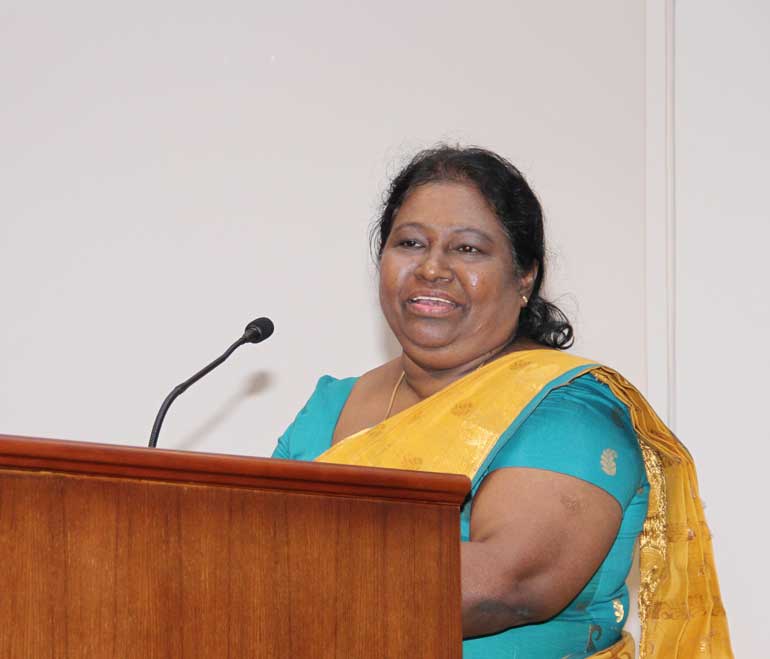Tuesday Feb 17, 2026
Tuesday Feb 17, 2026
Thursday, 13 August 2015 00:00 - - {{hitsCtrl.values.hits}}
 IRD Commissioner General Kalyani Dahanayake
IRD Commissioner General Kalyani Dahanayake
By Charumini de Silva
The Inland Revenue Department (IRD) has collected total revenue of Rs. 169 billion during the first half of the year.
Speaking to the Daily FT, IRD Commissioner General Kalyani Dahanayake said that despite reductions in various taxes the department managed to post a 10% growth.
During the first half of 2015, the department collected direct taxes of 41.5% (income tax and economic charges, stamp duty) and indirect taxes of 58.4% (VAT and Nation Building tax).
She said that government revenue was expected to increase at a higher rate going forward with the expected improvement in income taxation with continued expansion in domestic economic activities.
Nevertheless, she also noted that the expansion of the existing tax base was a must.
In the context of direct taxes, the revenue from Pay As You Earn (PAYE) tax or tax on wage income has increased by 19% to Rs. 2,115 million during the first six months from Rs. 1,416 million during the previous year — despite the lower tax rate structure and higher threshold built into the new tax system, the tax reforms introduced in 2011.
The Commissioner General explained that this significant increase was mainly due to increased employment and better wages in the high-earning categories of consultancy services, communication services, air transportation, commercial banks, import and export trade, tourism, construction and manufacturing products sectors.
“The increase in revenue has been collected amidst the reduction of tax rate on employment income of professionals as a measure of encouraging qualified individuals and their salaries, earnings,” said Dahanayake.
The revenue from income tax increased by 5% to Rs. 54,704 million compared to Rs. 52,140 million in the corresponding period of 2014. It contributed positively through corporate and non-corporate tax and PAYE. However, there was a decline in the revenue from economic service charge and withholding tax on interest.
Meanwhile, she pointed that the revenue from withholding tax on interest declined by 32% to Rs. 14,165 million during the first half of 2015 with the decline in market interest rates. The relatively lower issuance of treasury bills and treasury bonds has also resulted in this decline.
The revenue from VAT on a gross basis decreased by 8% to Rs. 8,732 million during the first six months compared to the same period of 2014.
Explaining the reasons for this decline, Dahanayake said that it was mainly due to the decrease in domestic VAT revenue, VAT rate reduction as well as the revenue on imports. The VAT revenue from imports has decreased by 18%. VAT and NBT domestic revenues have increased by 21% and 8% respectively while revenue adjustments on manufacturing tobacco, liquor and vehicle imports have been transferred to other government agencies in accordance with the Budget 2015.
Furthermore, she said the opening of new files would also increase substantially in line with the implementation of the Revenue Administration and Management Information System (RAMIS) which is expected to commence its operations in October 2015.
“Improvement in the tax administration with the introduction of an information technology environment and related human resource development activities facilitating efficient management of the new systems may result in higher revenue growth in the future,” she added.
Regarding the tax holidays given to the Board of Investment (BOI) registered companies Dahanayake said: “In 2011, the Government policy with regard to the investment was rationalised by amalgamating the tax holiday provision in the Inland Revenue Act with the Tax Holiday provisions of the BOI. As such, the BOI tax holidays are expected to be granted under the provisions of the Inland Revenue Act. The tax holiday schemes under the Inland Revenue Act were expanded in 2012 by introducing tax holidays for import expansion projects and qualifying payments for expansion projects and so forth.
With such provisions, upfront depreciation tripled deductions for expenses such as research and development, brand promotion was introduced in addition to the exemption granted for software development services provided to persons outside Sri Lanka for payment in foreign currency.
All these concessions are aimed at investment promotion and facilitating investment, she explained.